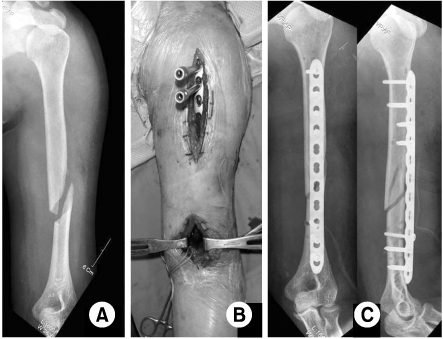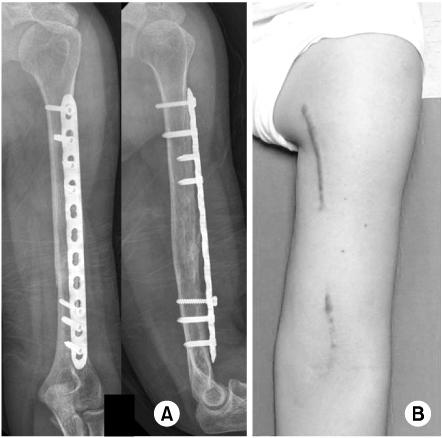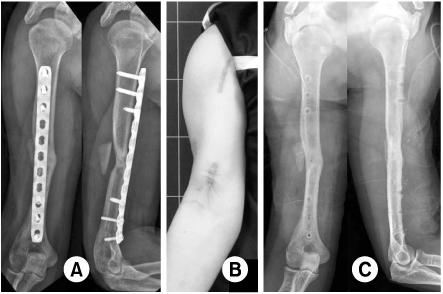J Korean Fract Soc.
2011 Oct;24(4):341-346.
Minimally Invasive Anterior Plating of Humeral Shaft Fractures
- Affiliations
-
- 1Department of Orthopaedic Surgery, Kyungpook National University Hospital, Deagu, Korea. cwoh@knu.ac.kr
Abstract
- PURPOSE
We evaluated the efficacy and results of minimally invasive anterior plating for humeral shaft fracture.
MATERIALS AND METHODS
Twenty-two cases of humeral shaft fracture were reviewed, including 8 cases of type A, 8 of type B and 6 of type C (AO/OTA classification). There were three open fractures. The fracture was fixed with MIPO (minimally invasive plate osteosynthesis) technique under C-arm guide. A locking compression plate was located in anterior aspect of the humerus with at least three screws fixed in each fragment. Radiologic and functional results were evaluated.
RESULTS
In 20 of 22 cases, bony union was achieved with the mean period of 17.5 weeks, including 2 cases of delayed union. There were 2 cases of nonunion, which needed the further operative procedure. Except one case of distal 1/3 fracture, all cases showed satisfactory elbow and shoulder function with the mean Mayo elbow score of 17.4 and mean UCLA shoulder score of 97.3. In complication, there was one case of radial nerve palsy due to improper traction, but it was completely improved after 3 months. Otherwise, there was no complication including infection.
CONCLUSION
Anterior MIPO for humeral shaft fracture may be another option of operative methods with high union and low complication rate.
MeSH Terms
Figure
Reference
-
1. Anglen JO, Archdeacon MT, Cannada LK, Herscovici D Jr, Ostrum RF. Avoiding complications in the treatment of humeral fractures. Instr Course Lect. 2009. 58:3–11.2. Apivatthakakul T, Arpornchayanon O, Bavornratanavech S. Minimally invasive plate osteosynthesis (MIPO) of the humeral shaft fracture. Is it possible? A cadaveric study and preliminary report. Injury. 2005. 36:530–538.
Article3. Bell MJ, Beauchamp CG, Kellam JK, McMurtry RY. The results of plating humeral shaft fractures in patients with multiple injuries. The Sunnybrook experience. J Bone Joint Surg Br. 1985. 67:293–296.
Article4. Bhandari M, Devereaux PJ, McKee MD, Schemitsch EH. Compression plating versus intramedullary nailing of humeral shaft fractures--a meta-analysis. Acta Orthop. 2006. 77:279–284.
Article5. Chapman JR, Henley MB, Agel J, Benca PJ. Randomized prospective study of humeral shaft fracture fixation: intramedullary nails versus plates. J Orthop Trauma. 2000. 14:162–166.
Article6. Chen AL, Joseph TN, Wolinksy PR, et al. Fixation stability of comminuted humeral shaft fractures: locked intramedullary nailing versus plate fixation. J Trauma. 2002. 53:733–737.
Article7. Dabezies EJ, Banta CJ 2nd, Murphy CP, d'Ambrosia RD. Plate fixation of the humeral shaft for acute fractures, with and without radial nerve injuries. J Orthop Trauma. 1992. 6:10–13.8. Ekholm R, Ponzer S, Törnkvist H, Adami J, Tidermark J. The Holstein-Lewis humeral shaft fracture: aspects of radial nerve injury, primary treatment, and outcome. J Orthop Trauma. 2008. 22:693–697.
Article9. Ellman H, Hanker G, Bayer M. Repair of the rotator cuff. End-result study of factors influencing reconstruction. J Bone Joint Surg Am. 1986. 68:1136–1144.
Article10. Fracture and dislocation compendium. Orthopaedic Trauma Association Committee for Coding and Classification. J Orthop Trauma. 1996. 10:Suppl 1. v–ix. 1–154.11. Gustilo RB, Anderson JT. Prevention of infection in the treatment of one thousand and twenty-five open fractures of long bones: retrospective and prospective analyses. J Bone Joint Surg Am. 1976. 58:453–458.
Article12. Heim D, Herkert F, Hess P, Regazzoni P. Surgical treatment of humeral shaft fractures--the Basel experience. J Trauma. 1993. 35:226–232.
Article13. Hierholzer C, Sama D, Toro JB, Peterson M, Helfet DL. Plate fixation of ununited humeral shaft fractures: effect of type of bone graft on healing. J Bone Joint Surg Am. 2006. 88:1442–1447.14. Jawa A, McCarty P, Doornberg J, Harris M, Ring D. Extra-articular distal-third diaphyseal fractures of the humerus. A comparison of functional bracing and plate fixation. J Bone Joint Surg Am. 2006. 88:2343–2347.15. Ji F, Tong D, Tang H, et al. Minimally invasive percutaneous plate osteosynthesis (MIPPO) technique applied in the treatment of humeral shaft distal fractures through a lateral approach. Int Orthop. 2009. 33:543–547.
Article16. Jiang R, Luo CF, Zeng BF, Mei GH. Minimally invasive plating for complex humeral shaft fractures. Arch Orthop Trauma Surg. 2007. 127:531–535.
Article17. Lin J, Hou SM. Locked nailing of severely comminuted or segmental humeral fractures. Clin Orthop Relat Res. 2003. 406:195–204.
Article18. Lin J, Shen PW, Hou SM. Complications of locked nailing in humeral shaft fractures. J Trauma. 2003. 54:943–949.
Article19. Livani B, Belangero WD. Bridging plate osteosynthesis of humeral shaft fractures. Injury. 2004. 35:587–595.
Article20. Livani B, Belangero WD, Castro de Medeiros R. Fractures of the distal third of the humerus with palsy of the radial nerve: management using minimally-invasive percutaneous plate osteosynthesis. J Bone Joint Surg Br. 2006. 88:1625–1628.21. McCormack RG, Brien D, Buckley RE, McKee MD, Powell J, Schemitsch EH. Fixation of fractures of the shaft of the humerus by dynamic compression plate or intramedullary nail. A prospective, randomised trialr. J Bone Joint Surg Br. 2000. 82:336–339.22. Morrey BF, Adams RA. Semiconstrained arthroplasty for the treatment of rheumatoid arthritis of the elbow. J Bone Joint Surg Am. 1992. 74:479–490.
Article23. Olarte CM, Darowish M, Ziran BH. Radial nerve transposition with humeral fracture fixation: preliminary results. Clin Orthop Relat Res. 2003. 413:170–174.24. Park JY, Oh JH, Kho DH, Jung JK. Intramedullary nail on the humeral fracture. J Korean Fract Soc. 2008. 21:244–254.
Article25. Shao YC, Harwood P, Grotz MR, Limb D, Giannoudis PV. Radial nerve palsy associated with fractures of the shaft of the humerus: a systematic review. J Bone Joint Surg Br. 2005. 87:1647–1652.26. Shin HD, Rhee KJ, Kim KC, Song HS. Operative treatment of traumatic humeral shaft fracture: comparision of interlocking IM nailing and plate fixation by posterior approach. J Korean Fract Soc. 2005. 18:93–99.
Article27. Volgas DA, Stannard JP, Alonso JE. Nonunions of the humerus. Clin Orthop Relat Res. 2004. 419:46–50.
Article
- Full Text Links
- Actions
-
Cited
- CITED
-
- Close
- Share
- Similar articles
-
- Comparative Analysis of the Result of Minimally Invasive Anterior Plating and Open Reduction and Internal Fixation in Humerus Shaft Simple Fracture
- Internal Fixation of Humeral Shaft Fractures Using Anterior Plating Technique
- Helical Plating for Fractures of the Proximal Humeral Shaft
- Minimal Invasive Plate Osteosynthesis versus Conventional Open Plating in Simple Humeral Shaft Fracture (AO Type A, B1, B2)
- Minimally Invasive Plate Osteosynthesis for Humeral Proximal or Distal Shaft Fractures Using a 3.5/5.0 Metaphyseal Locking Plate





